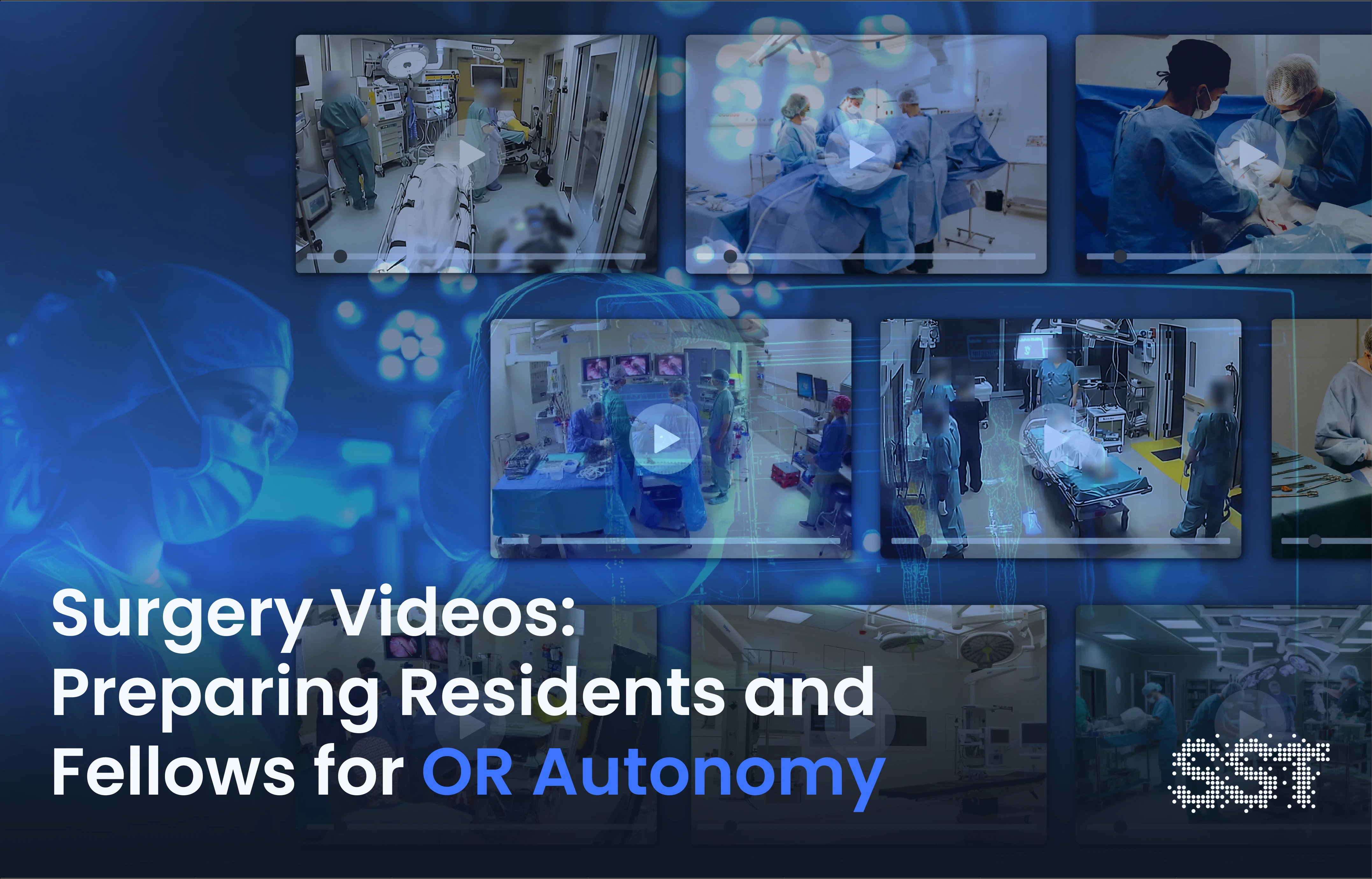TRAINING AND EDUCATION
Redefining Surgical Training: Harnessing Technology for Resident Growth
Explore how surgical education is being transformed through video review, simulations, and anticipatory training to create more skilled surgeons.
Apr 16, 2025
Joshua Villarreal, MD
General Surgery Resident and Clinical Informatics Fellow
The landscape of surgical training is undergoing a profound transformation.¹ Traditional methods, though foundational, are increasingly supplemented by cutting-edge technologies aimed at refining skill acquisition and preparing residents for the complexities of modern surgical practice. Surgical video review, scenario-based simulation, and an emphasis on deliberate practice are at the forefront of this shift, offering tailored, engaging approaches to training and education. These innovations enhance resident self-evaluation while also empowering educators to craft more impactful teaching frameworks.
Surgical Video Review: A Clearer Path to Mastery
Surgical video review is an indispensable tool in surgical training and education,² offering a unique lens into technical performance. Trainees are able to capture and analyze operative cases in high fidelity, gaining the ability to break down videos into precise, teachable moments. Unlike traditional assessments reliant on memory or subjective feedback, surgical video review creates a visual, objective record that highlights strengths and areas for improvement.
Trainees and attendings benefit significantly from the structure and clarity provided by surgical video analysis.³ For instance, they can meticulously review critical moments in procedures, compare their techniques to those of master surgeons, and develop a deeper understanding of procedural nuances.
Surgical educators are also leveraging video review to enhance their teaching. They are incorporating video analysis into debriefing sessions⁴ to guide trainees in the recognition of preventable errors or inefficiencies and highlight their strengths. This tailored approach ensures that feedback is actionable and directly tied to individual performance, resulting in more effective skill development.
Scenario-Based Simulation: Preparing for the Unexpected
Scenario-based simulation has emerged as a powerful technology-driven method for preparing residents to tackle complex or urgent situations. This modality immerses learners in realistic surgical scenarios, creating a safe environment for practicing critical thinking, teamwork, and technical skills without risking patient safety.
Surgical simulations can be tailored to address specific educational needs. For example, a trainee struggling with surgical emergencies can engage in scenarios that replicate high-pressure environments,⁵ refining their decision-making skills under pressure. Similarly, trainees preparing for lower-volume procedures can practice key aspects in detail, either independently or as a team-run simulation, to ensure effective non-technical skills and heightened confidence and competence when faced with real-life cases.
Multi-disciplinary simulations⁶ bring together surgeons, nurses, and anesthesiologists to mirror the dynamics from the trauma bay to the operating room. This team-based approach improves communication, reinforces shared goals, and builds trust among team members—a critical factor in successful surgical outcomes.
Anticipatory Training: Looking Beyond the OR
Anticipatory training⁷ goes one step further by actively preparing for worst case scenarios before they arise. This proactive approach combines data-driven insights with predictive modeling to identify potential gaps in clinical processes, knowledge, or skills. Armed with this information, educators can design curriculums that address these gaps, ensuring residents are equipped for emerging surgical trends and evolving technologies.⁸
For example, as robotic surgery and AI-assisted procedures become more prevalent, anticipatory training helps residents adapt to these innovations. Through hands-on workshops, real-time feedback, and targeted practice, residents gain familiarity with new tools and methodologies,⁹ ensuring they remain ahead of the curve.
Beyond technology, anticipatory training emphasizes emotional resilience. It equips residents with strategies to manage stress, skills to ensure effective and closed-loop communication under pressure, and the ability to maintain focus during prolonged or complex surgeries. Anticipatory training nurtures both technical and emotional preparedness to produce well-rounded surgeon leaders.
Transforming Surgical Training Through Technology
Together, these education strategies—surgical video review, scenario-based simulation, and anticipatory training—are pushing surgical training to the cutting edge. They empower trainees to take ownership of their learning, offering tools for self-assessment and the ability to track progress over time. They also provide educators with the flexibility to create individualized training plans that address each resident’s unique challenges and career goals.
The impact of these strategies is far-reaching. Residents gain both technical competence and the confidence to tackle a rapidly evolving healthcare landscape. Surgical training programs are fostering an education framework that is dynamic, adaptable, and deeply effective,¹⁰ setting the stage for the next generation of surgeons—one capable of delivering safe, innovative, and compassionate care.
Surgery is still an art and a science, and new technologies are bridging these two dimensions to converge more seamlessly than ever before. The integration of advanced tools and strategies into training teaches residents how to operate while also equipping them to lead the future of medicine. The next step in this surgical evolution will be exploring ways to connect the vast amounts of data and meta-data across these platforms. Imagine a training program where surgical videos, simulations, and predictive analytics all work together to create a cohesive learning ecosystem.
The future of surgical training is here, and we’re excited to be part of this transformation. Whether you’re an educator, trainee, or institution looking to integrate cutting-edge training solutions, we’re here to help.
Frequently Asked Questions (FAQs)
How does surgical video review enhance resident training?
Surgical video review provides an objective and high-fidelity method for residents to analyze their procedures. It also allows faculty to break down surgeries into teachable moments, identify areas for improvement, and compare techniques with experienced surgeons. This method fosters self-awareness, continuous improvement, and more effective skill development.
What are the key benefits of scenario-based simulation?
Scenario-based simulation immerses trainees in realistic surgical situations, helping them develop leadership skills, decision-making abilities, and teamwork in a risk-free environment. It prepares them for unexpected challenges, reinforces collaborative dynamics, and enhances their confidence in handling complex cases.
How does anticipatory training differ from traditional surgical education?
Anticipatory training proactively identifies skill gaps and prepares trainees for future surgical advancements such new technologies and techniques. It integrates data-driven insights, predictive modeling, and emotional resilience strategies to ensure well-rounded, future-ready surgeons.
How are educators using these technologies to improve training?
Educators are leveraging video review for precise feedback, incorporating simulation to replicate real-life surgical challenges, and using anticipatory training to address emerging trends. These approaches allow for personalized training plans tailored to each resident’s unique needs and career goals.
What role does team-based simulation play in surgical training?
Team-based simulations bring together surgeons, nurses, and anesthethesiologists in a collaborative training environment. It improves individual and team performance by developing collaboration and communication skills and highlighting team dynamics in a powerful, but non-threatening fashion. Simulation training improves communication, fosters trust, and strengthens coordination among surgical teams, ultimately enhancing patient safety and surgical outcomes.
How is technology shaping the future of surgical education?
Innovations such as video analytics, virtual simulations, and AI-driven anticipatory training are creating a more structured and adaptive learning ecosystem. As these technologies evolve, they will further integrate into training programs, offering a seamless, data-driven approach to skill acquisition.
Can these methods replace traditional surgical training?
No, these methods are designed to supplement—not replace—traditional hands-on surgical training. They enhance learning by providing structured feedback, improving technical precision, and preparing residents for complex real-world scenarios.
What are the next steps in surgical education innovation?
Future advancements may focus on integrating data across training platforms, allowing surgical video reviews, simulations, and predictive analytics to create a cohesive learning environment. This interconnected approach has the potential to revolutionize surgical education by offering more personalized and data-driven training solutions.
Recommended Reading
Shahrezaei, A., Sohani, M., Taherkhani, S., et., al. (2024). The impact of surgical simulation and training technologies on general surgery education. BMC Med Educ;24;1297. https://www.doi.org/10.1186/s12909-024-06299-w.
Green, J.L., Suresh, V., Bittar, P., et., al. (2019). The Utilization of Video Technology in Surgical Education: A Systematic Review. J Surg Res;235; 171-180. https://www.doi.org/10.1016/j.jss.2018.09.015.
Villareal, J. (2024, November 4). Surgical Video Review: A Gold Mine for New Residents and Fellows. Surgical Safety Technologies. https://www.surgicalsafety.com/blog/surgical-video-review-gold-mine-for-new-residents-fellows.
Schertzer, K. & Waseem, M. (2023). Use of Video During Debriefing In Medical Simulation. StatPearls Publishing. https://www.ncbi.nlm.nih.gov/books/NBK554619/.
Hoang, T.N., LaPorta, A.J., Malone, J.D., et., al. (2020). Hyper-realistic and immersive surgical simulation training environment will improve team performance. Trauma Surg Acute Care Open;5(1); e:000393. https://www.doi.org/10.1136/tsaco-2019-000393.
Hibberson, M., Lawton, J., & Whitehead, D. (2021) Multidisciplinary simulation training for perioperative teams: An integrative review. J Periop Nursing;34(2). https://www.doi.org/10.26550/2209-1092.1111.
Hashemi, G., Zhang, Y., Wu, Y., et., al. (2024). Perioperative inter-professional education training enhance team performance and readiness. Clinical Simulation in Nursing;97; 101655. https://www.doi.org/10.1016/j.ecns.2024.101655.
Elendu, C., Amaechi, D.C., Okatta, A.U., et., al. (2024). The impact of simulation-based training in medical education: A review. Medicine;103(27); e38813. https://www.doi.org/10.1097/MD.0000000000038813.
Villareal, J. (2025, January 9). Surgery Videos: Preparing Residents and Fellows for OR Autonomy. Surgical Safety Technologies. https://www.surgicalsafety.com/blog/surgery-videos-transforming-training.
Royal College of Surgeons in England. (2022). Technology Enhanced Surgical Training: Future of Surgery. https://futureofsurgery.rcseng.ac.uk/wp-content/uploads/2022/08/FOS_Test_Report_2022.pdf.






